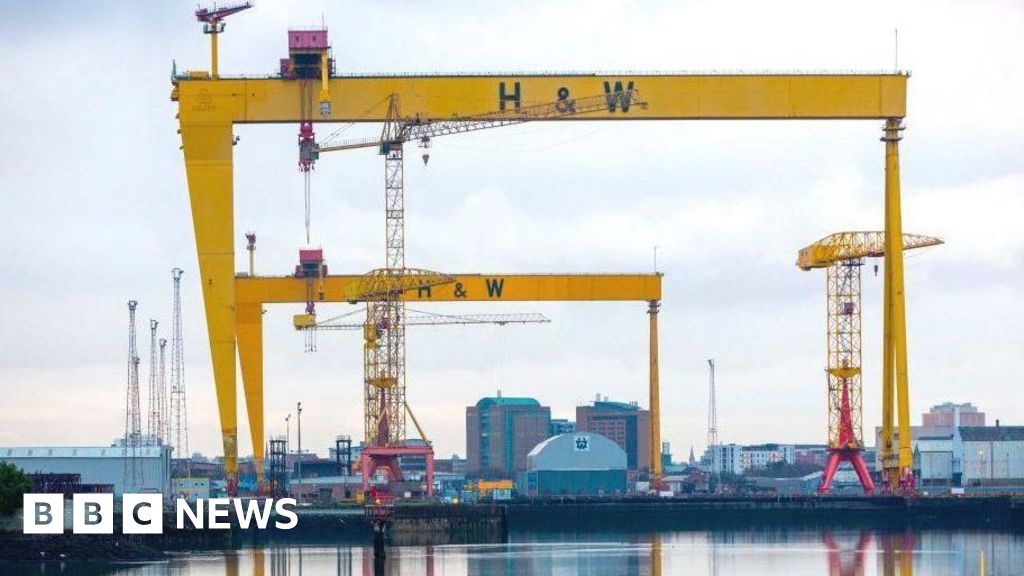Image source, Getty Images
- Author, John Campbell
- Role, BBC News NI economics and business editor
In August 2019, Harland and Wolff seemed done.
The Belfast shipbuilder, best known for the Titanic, had gone bankrupt after losing the support of its Norwegian owners.
It had not built a ship for almost two decades and its workforce had dwindled to just 120, compared to more than 30,000 at its peak, just after World War II.
But uncertainty returned after reports that the Finance Ministry planned to block a government loan guarantee seen as essential to the company’s future.
This was strongly denied by the company, which described the report as “misleading and inaccurate”. The government also said no decision had been made yet.
Material uncertainty – accountant
However, there is no doubt that the company is in a vulnerable financial position as it tries to scale up ahead of the planned start of the naval contract next year.
The last published accounts covered the first half of 2023 and showed a turnover of £26 million and a loss of £32 million.
The 2022 audited accounts showed a turnover of £28 million and a loss of £70 million. In the previous 17-month accounting period the loss was more than £25 million.
In their review of the 2022 accounts, the company’s independent auditor said there was “material uncertainty” about its ability to continue as a going concern without new contracts and additional financing.
The auditor noted that the company was in discussions with potential lenders and investors, but there was no assurance that these discussions would be successful.
Currently, Harland and Wolff’s main lender is Riverstone Credit Partners, a New York-based company that specializes in lending to energy and infrastructure companies.
It has provided a $100 million (£80 million) loan that expires at the end of this year. It comes with a relatively high interest rate of the Secured Overnight Financing Rate (SOFR) plus 9%.
The SOFR is a benchmark rate for dollar-denominated loans that is currently around 5%, meaning Harland and Wolff could pay as much as 14% on that loan.
The company wants to refinance the loan and take out more loans at a lower interest rate. This is where the government comes into the picture.
Harland and Wolff want the government to guarantee up to £200 million in loans from British banks. That means if the loans went bad, the government would step in to pay back the lenders.
The company has applied for an Export Development Guarantee (EDG), a scheme to help companies exporting, or planning to export, from the UK to obtain loans for general working capital or capital investment.
This normally involves a guarantee that covers up to 80% of the risk for lenders, with a maximum repayment period of five years.
It is unusual for Harland and Wolff to ask for a 100% guarantee. In February, Labor MP Kevan Jones asked how many EDG loans had been guaranteed on those terms in the past five years.
The business secretary, Greg Hands, responded that there had never been a 100% guarantee, but that “in principle, consideration could be given to guaranteeing percentages above 80% where this is necessary to ensure the success of the transaction.”
Shipyard multi-year plan
On Wednesday, Harland and Wolff said discussions with government departments and financial institutions “continue to progress at pace” over what is “a complex and major transaction for all parties.”
It described its financial partners and shareholders as “very supportive” and “aware of the long-term plan.”
One way to view Harland and Wolff right now is as a start-up rather than a mature industrial company.
Start-ups often operate at a loss in their early years as they develop their products, hire staff and try to break into established markets.
The intention is that revenues will grow and profits will follow, but in the meantime, investors and lenders will provide the company with a financial ‘runway’.
Harland and Wolff does start-up-like things, such as hiring a lot of staff, so that it has the scale to deliver profitable projects.
The question now is whether the government will commit to extending its runway. We will probably know the answer within a few weeks.
